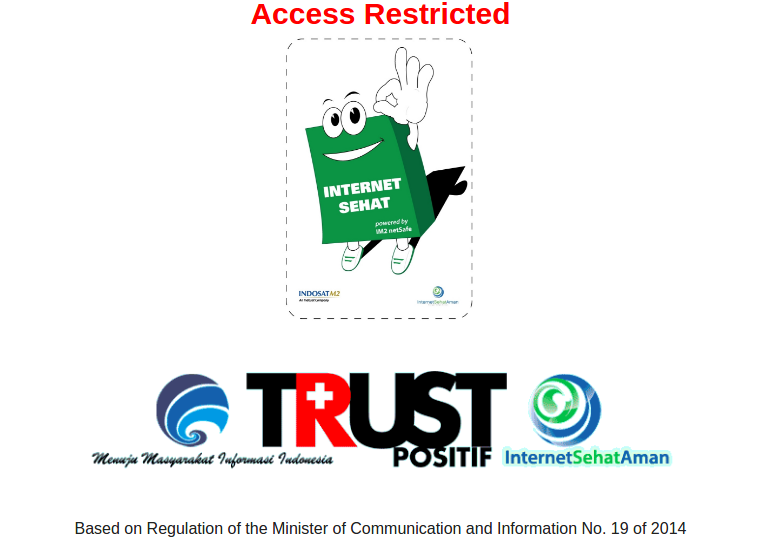The State of Internet Censorship in Indonesia

Today, in collaboration with Sinar Project, the Open Observatory of Network Interference (OONI) released a new research report: The State of Internet Censorship in Indonesia.
OONI network measurement data collected from 21 local vantage points confirms the blocking of 161 websites in Indonesia between 22nd June 2016 to 1st March 2017. Indonesian ISPs appear to be implementing block pages primarily through DNS hijacking.
Even though Indonesia’s government announced that it would primarily be blocking sites hosting pornographic materials and gambling applications, we found numerous other sites to be blocked as well. Multiple sites expressing criticism towards Islam were found to be blocked, possibly under Article 156(a) of Indonesia’s Criminal Code which prohibits blasphemy against religions.
Other blocked sites include:
- LGBT sites;
- A blog expressing political criticism;
- An independent U.S. news outlet;
- A site, led by female activist artists, that defends gender and ethnic rights;
- Anonymity tool sites;
- Hosting platforms;
- An online translator;
- Popular online dating sites;
- Sites providing sex education and information about AIDS/HIV prevention;
- A site featuring tattoos and piercings;
- Gaming sites.
Vimeo and Reddit were found to be blocked in some networks in Indonesia, even though their ban was lifted more than two years ago. This highlights the need for oversight, to ensure that sites are unblocked after bans are lifted.
A popular animal rights site was also found to be blocked, possibly because it was mistaken for a pornographic website due to its domain (peta.xxx). While various censorship events identified as part of this study can be legally justified (such as the blocking of pornography or online gambling), the justification behind the blocking of many other sites remains unclear.
Under the MICT’s 2014 decree, Indonesian ISPs are granted the authority to ban “negative content” at their own discretion, regardless of whether such sites are included in the official Trust Positif blocklist. This excessive authority granted to Indonesian ISPs may explain why many different types of sites were found to be blocked across different networks.
The data published through this report indicates that social and cultural norms may have influenced internet censorship decisions. Sites featuring provocative attire, for example, were found to be blocked, possibly under loosely interpreted anti-pornography laws. Even though the Free Speech Coalition (FSC) does not distribute pornography, its site was likely censored for supporting and defending those who work in the adult entertainment industry.
On a positive note, internet censorship in Indonesia can probably be circumvented through the use of Tor software. OONI data shows that the Tor network was accessible in Indonesia during the testing period.
This study is part of continuous efforts to monitor internet censorship events around the world. By running ooniprobe, you can contribute to these efforts too!
Journalists, social scientists, policy makers, researchers, and human rights defenders are encouraged to explore OONI data (from Indonesia and beyond) to ask and answer questions that we may not have even considered.

Comments
Please note that the comment area below has been archived.
"Multiple sites expressing…
"Multiple sites expressing criticism towards Islam were found to be blocked"
How about sites that belittles other recognized religions in that country (Christianity, Hinduism, Buddhism, and Confucianism) are they also blocked?
Hi. Great report. Well…
Hi. Great report. Well done. Here are some typo/formatting errors which you could correct:
"free of expression" --> freedom of expression
"mobile services have seen a ," --> ?? missing word.
"research from 2013
which documented 4 command and control" --> remove the new line
Yes, I have found some of…
Yes, I have found some of the DNS are acting weirdly. I triend Yandex dns and Norton Dns but in april, there is a blocking, very slow. IT seems all my request being forwarded to other place. Lucky, I still can access faithfreedom.org or jihadwatch.org.
https://en.wikipedia.org…
https://en.wikipedia.org/wiki/First_Media
https://en.wikipedia.org/wiki/Telkom_Indonesia
SATCOM
http://www.satproviders.com/en/list-of-all-services/INDONESIA
https://en.wikipedia.org/wiki/National_Institute_of_Aeronautics_and_Spa…
>Other blocked sites include…
>Other blocked sites include:
What a fucking state Indonesia is!
just testing comments…
just testing comments...
They will censor everything (any VPN services including Tor browser) in Russia soon. Keep an eye on that, Tor Project!